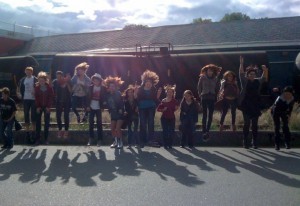Trust Children. Nothing could be more simple — or more difficult. Difficult, because to trust children we must trust ourselves — and most of us were taught as children that we could not be trusted. – John Holt
I trust kids. I am not being trivial here; it’s true. I trust how much they unabashedly trust, especially the adults in their lives. And we (us adults) gotta step up to that trust from kids around us and not only give trust back, but keep their trust in us by not fucking with it! The innate trust from kids gradually gets sucked out of them in all corners of society, including home. Why? Because of the largely accepted notion that kids are not to be trusted. I think this is one of the most damaging and brutal forms of discrimination against kids/youth.
But how do we trust each other, up front and in real concrete ways? Like Holt says, it’s both simple and difficult. In a practical sense, and how this works in my day-to-day life is I believe that if you give over trust to someone in a social setting like the Purple Thistle, then most people will rise to the occasion and do well by each other and themselves. Think about yourself for a second: what does it feel like when someone thinks super well of you, and trusts you to do your best and all of that happens up front, without you having to “earn it” or “prove it”? It can feel strange and scary for sure, but it can and does feel incredibly freeing, and make you feel capable, too.
Giving folks, and especially young folks that trust up front is a terrific and important place to start. In fact, I think it’s the most important foundation for a strong and caring community. I am not talking about the kind of trust you would build over time in your long-term core relationships, but something more in line with care and respect, like friendship. I think without a starting place of trust, our foundations are weak, and then all kinds of problems can grow from that lack of trust in each other. In contrast, when I’m trusted, I do better: I’m going to step up and do well by that trust. So, I think starting with something simple like: “I trust that the folks who I am working with will do their best” is a terrific place to begin to rethink our practices and the ways we treat each other.
But what does that look like? It happens in all kinds of subtle ways, and it’s relational. A concrete example that separates the Thistle from many other youth projects is that each youth on the collective has keys to the space and are free to use them anytime. The youth don’t have to go through some big formal interview process, or sign over their life to have a set. A lot of bureaucratic procedures like this are really based in distrust, I think. We just ask that if you’re new to the space, to just hang out a bit and get to know us first — and sometimes, you get the keys on your first night there. This little practice—along with others based on trusting people up front—help create wonderful environment of shared trust and kindness, a space filled with friendship where people are supporting each other.
At the Thistle, what I have noticed is that this kind of trust gives us an ability to be brave, to try new things, to take a chance and to be vulnerable. This kind of trust in each other doesn’t mean we don’t mess up, no, in fact, it actually means we fail sometimes, but that failing happens with a lot of support and care! With a foundation of trust, we are free to learn, to grow and to do the best we can. And at the Thistle, that sometimes means causing some good, decent trouble.
with friendship! carla
